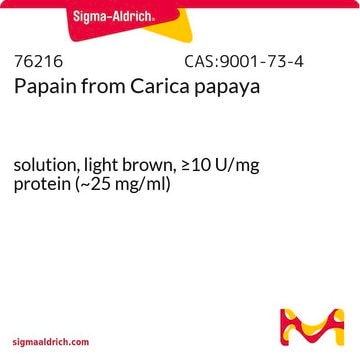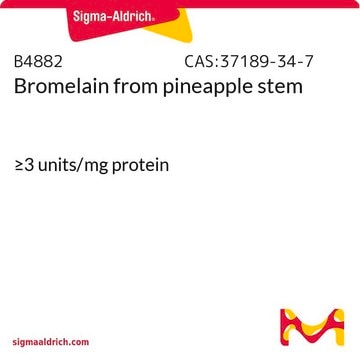10108014001
Roche
Papain
from Carica papaya
Sinónimos:
cystein protease, papain
Iniciar sesiónpara Ver la Fijación de precios por contrato y de la organización
About This Item
Productos recomendados
biological source
papaya
Quality Level
form
suspension
specific activity
30 U/mg
~30 units/mg protein (At 25 °C with BAEE as the substrate.)
mol wt
23 kDa
packaging
pkg of 10 mL (100 mg)
manufacturer/tradename
Roche
concentration
10-100 mg/mL
optimum pH
6.0-7.0
shipped in
wet ice
General description
Papain is a cysteine protease of the papain family. It is a single chain protein. The molecular weight of papain is 23 kDa. Papain is composed of two structural domains and a cleft between them, which consists of the active site.
Application
Papain has been used in the digestion of various brain cells.
Use Papain for the complete proteolytic cleavage of proteins, limited hydrolysis of native immunoglobulins, and tissue dissociation (together with collagenase, esterase, and trypsin). The enzyme solubilizes integral membrane proteins and produces glycopeptides from purified proteoglycans. The addition of cysteine (approximately 0.5% [w/v]) is essential for enzyme activity.
Biochem/physiol Actions
Papain exhibits proteolytic activity against amide links, amino acid esters, peptides, proteins. It mainly cleaves peptide bonds containing amino acids such as lysine, arginine and residues succeeding phenylalanine. It can catalyze several reactions, such as hydrolysis, transferase action, specificity and acyl-enzyme intermediate.
Features and Benefits
Inhibitors: SH-blocking reagents, iodoacetic acid, iodoacetamide, TPCK, TLCK, leupeptin, a2-macroglobulin, E-64, PMSF, and antipain, Hg2+, and other heavy metals
Physical form
Suspension, crystalline, nonsterile
Preparation Note
Working concentration: 0.05 to 0.5 mg/ml
Storage and Stability
Store at 2 to 8 °C. (a decrease in activity of 20% may occur within 6 months)
Other Notes
For life science research only. Not for use in diagnostic procedures.
Storage Class
12 - Non Combustible Liquids
wgk_germany
nwg
flash_point_f
does not flash
flash_point_c
does not flash
Certificados de análisis (COA)
Busque Certificados de análisis (COA) introduciendo el número de lote del producto. Los números de lote se encuentran en la etiqueta del producto después de las palabras «Lot» o «Batch»
¿Ya tiene este producto?
Encuentre la documentación para los productos que ha comprado recientemente en la Biblioteca de documentos.
Los clientes también vieron
John S. White and Dorothy C. White
Source Book of Enzymes null
Monica Tambalo et al.
Development (Cambridge, England), 147(6) (2020-02-26)
Segmentation of the vertebrate hindbrain leads to the formation of rhombomeres, each with a distinct anteroposterior identity. Specialised boundary cells form at segment borders that act as a source or regulator of neuronal differentiation. In zebrafish, there is spatial patterning
Spatiotemporal ablation of CXCR2 on oligodendrocyte lineage cells: Role in myelin repair
Liu L, et al.
Neurology? neuroimmunology & neuroinflammation, 2(6), e174-e174 (2015)
LIM Kinase, a Newly Identified Regulator of Presynaptic Remodeling by Rod Photoreceptors After Injury.
Wang W and Townes-Anderson E
Investigative Ophthalmology & Visual Science, 56(13), 7847-7858 (2015)
The structure of papain
Advances in Protein Chemistry, 25, 79-115 (1971)
Nuestro equipo de científicos tiene experiencia en todas las áreas de investigación: Ciencias de la vida, Ciencia de los materiales, Síntesis química, Cromatografía, Analítica y muchas otras.
Póngase en contacto con el Servicio técnico









